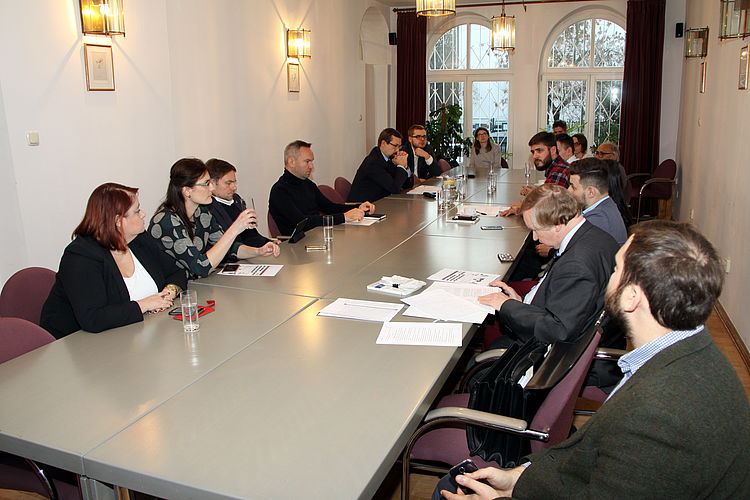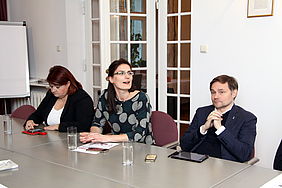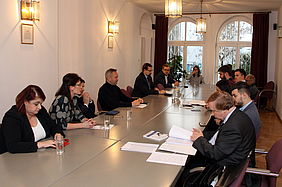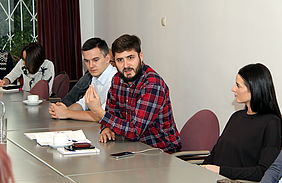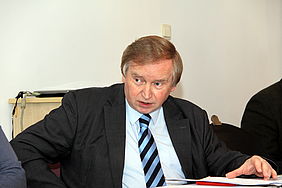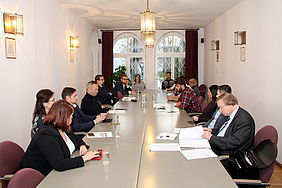Taking part — as presenters — in the meeting were: Anna Godzwon (expert on electoral law), Professor Ryszard Piotrowski (Warsaw University Office of Law and Administration), Karol Reczkin (Analysis Center at the International Institute of Civil Society), Piotr Trudnowski (Jagielloński Club), Marcin Wojdat (Secretary of the City of Warsaw) and Dr. Jarosław Zbieranek (Office of the Press Secretary of Citizens’ Rights). The discussion’s moderator was Mateusz Komorowski (President of the International Institute of Civil Society).
Before the 2018 municipal elections, thousands of people signed up to the electoral register via the internet to be able to vote absentee. Despite correctly filling out the Electronic Platform for Public Services (EPPS) application, many citizens still couldn’t take part in voting. The Citizens’ Rights Representative is currently dealing with this issue, and the Ministry of Digitization states the form was worked out in accordance with the law and that local government offices — which rejected the forms or weren’t able to provide a decision on them in time — are to blame for the current situation. In turn, those local offices feel that the problem arose via erroneously designed forms and a poorly working electronic system, which the Ministry was responsible for. Regardless of which administrative public entity should bear responsibility for the current situation (and to what extent), it should be recognized that the public electronic administrative apparatus in Poland has failed. This meeting’s goal was to discuss the circumstances surrounding this situation and to attempt to form recommendations as to what should be done so that voter registry issues don’t take place in the future.
The right to vote is one of the constitutional citizens’ rights which many voters have been prevented from taking advantage of in the last few municipal elections. Exactly how many people possessing this right were unable to vote (despite clearly expressing the will to do so) cannot be left solely to the realm of conjecture. Citizens affected by this problem feel bitterness. Their trust in procedures and in the state has been lessened. Another issue arises when the problem is looked at from the perspective of local election candidates. Electoral victories often are decided by the advantage of a few votes. What if a losing candidate’s voters were among those that couldn’t vote? Every vote is important and every vote counts. People can’t remain neutral as to what has taken place. This issue is serious enough that one of the main demands of the meeting’s panelists was the complete freeze of election services within the EPPS system pending an explanation of all problematic issues, along with the implementation of services which comprehensively and effectively handle the process.
Professor Ryszard Piotrowski, of the Warsaw University Office of Law and Administration, drew attention to the five most important issues from a legal point of view concerning this issue: 1) the general constitutional background 2) electoral law as political law 3) the institution of additions to the voter registry 4) the specification of what EPPS traps involve and 5) indicating how to avoid them in the future.
In terms of the general constitutional background Professor Piotrowski noted that, given the preamble to the Polish Constitution, the basis of operation for public institutions is reliability and efficiency. A certain constitutional value akin to law results from the constitution — acting in this context as a normative base for the organization of the Polish Republic. Consequently, solutions that lead to situations which are incompatible with the facts cannot be tolerated within this system (which in this case is what took place). On the other hand, state institutions in Poland operate on the basis — and within the limits — of law, and this results from the principle of legalism (which makes up one of the constitutional principles). From a literal point of view, despite all of these issues the application itself for voter registry additions was correctly prepared. However, that doesn’t change the fact that the state should be loyal to its addressees (which arises from the Constitutional Tribunal’s Jurisprudence). The law cannot be a trap for citizens — and unfortunately in this case it was.
Referring to the issue of a pure right to vote as a political right, Professor Piotrowski noted that from that right arise the duties of those public authorities associated with its implementation. First, the universality of a right to vote is a spontaneous constitutional value, and therefore efforts should be made as to its implementation. Second, public authorities have an obligation of heightened alertness so that this principle of universality doesn’t lead to abuse. The institution of a voter registry is formed in such a way as to act as a pure guarantee of the right to vote. However, due to its relationship with this principle and with citizens’ political rights, it should be applied in accordance with the principle of in dubio pro libertate, or in case of doubt a respect for citizens’ rights should be the guide (and hence the obligation of heightened alertness loosened).
In terms of the institution of voter registry additions, Professor Piotrowski stressed that the law creates certain procedures and deadlines — which unfortunately are very imprecise. The decision to register a citizen in a given municipality is respectively issued by the village head/mayor/town president, and the legal responsibility in this regard lies with them. If, it turns out, that citizens who entered their information into a registry submitted a false declaration, the village head/mayor/town president can be punished for political corruption and abuse for attempting to influence election results. Yet on the other hand, in such a situation a citizen can be completely forced to rely on an arbitrary decision of the village head in terms of voter registry additions in a given municipality.
Specifying what the EPPS involves, Professor Piotrowski observed that — at the present time — a collision is taking place between a paper culture and a digital culture. In light of this the current system is operating in accordance with the principle of quod non est in actis, non est in mundo, or “that which is not on paper does not exist”. A digital culture can promote the previously discussed universality on the condition that regulations will be precisely and clearly formulated — and unfortunately, in this case such a situation was not the case.
Wanting to indicate how to avoid future EPPS traps, Professor Piotrowski noted that the application form for additions to the voter registry drawn up by the Ministry of Digitization was formally correct. Likewise, communities have also proceeded in accordance with the law. At the same time — per electoral code regulations — the obligation to verify if a given resident actually resides in a certain municipality rests with the village head/mayor/town president, although it is not specified in what way that verification is to occur and in what way a citizen is to prove where they live. In this context, Professor Piotrowski returned to a very important issues for citizens — individual privacy and dignity. The requirement imposed on them to present lease agreements, employment contracts or bills to municipal entities involves sensitive data that is especially protected by the law. In his expert opinion, to avoid electoral EPPS traps in the future electoral code regulations should be changed and a form should accordingly be fashioned around them, in addition to registration deadlines being lengthened.
In the opinion of the Secretary of the City of Warsaw Marcin Wojdata, EPPS should be a system that communicates with the citizen and handles the entire procedure of inputting a resident’s information into the registry. The system still works on the same principles as postal mail — only sending documents to local government offices. In his opinion, this is not what the introduction of digital solutions involves. Furthermore, the Ministry of Digitization — cloaking itself in the European Union’s General Data Protection Regulation (GDPR) — justified the lack of an obligation to attach documents required by local governments when issuing a decision. According to him this is not a convincing argument, as people who were summoned by a municipality to send the required documents did so precisely via the EPPS platform — such a possibility existed in the second step of the process and at that time GDPR regulations weren’t considered. The Secretary cited data that graphically shows the scale of the problem in Poland’s capital. Through the so called “window” 18,000 applications were delivered, of which just less than 1% were rejected — hence, at district government offices the system worked. For comparison’s sake, in the case of applications submitted via the EPPS, as many as 46% of applications were rejected.
According to Anna Godzwon, the EPPS system disappointed and the Ministry of Digitization shouldn’t evade responsibility. The fact that the State Electoral Commission and the National Election Office aren’t approaching the situation seriously is a mistake. The legislature didn’t consider strengthening the procedure to carry out voter registry additions via the internet and, in Anna’s opinion, electoral code regulations should specify a catalog of documents that are required of a citizen by local governments offices.
Piotr Trudnowski drew attention to the handling of the EPPS system, which caused difficulties to such a degree that it has the potential to be an insurmountable barrier to the average citizen. What’s more, the conveyance of non-anonymous documents by electronic means is a problem that obviously threatens privacy. According to the Jagielloński Club expert, it is scandalous that the subject of irregularities within the EPPS registration process disappeared just a day after the municipal elections (leaving the issue with no lessons learned for future reference).
In Piotr Trudnowskiego’s opinion, those people responsible for the irregularities should bear political consequences for their actions and be dismissed. Further, this was not the first case of such irregularities in recent years — which regrettably, in the presenter’s evaluation, speaks to the superficiality of the rule of law in Poland. This coincidence gives birth to serious fears that, unfortunately, could lead to external interference in the electoral process.
Jarosław Zbieranek, of the Office of the Press Secretary of Citizens Rights, quoted fragments taken from the complaints of citizens who submitted their applications via the EPPS, but couldn’t take part in local government elections. What emerged from their letters was that they weren’t aware of the fact that, after filling out the EPPS application with a scan of their ID and a signed declaration, anyone else could demand more information of them. It was also confusing that, after application completion, a message about a successfully sent form was displayed. What’s more, the fact that complete feedback was missing post-submission to the registry also posed a problem. Many residents received information regarding an application’s rejection only after the elections, and in many cases a response from the local government office still has yet to be received.
Karol Reczkin of the Analysis Center at the International Institute of Civil Society (IICS) observed that the Ministry of Digitization expected danger on a completely different front. A website was created advising the avoidance of fake electoral news. The Ministry held a press conference during which it, together with one of the candidates for the Warsaw President, advertised a service that relied on entering one’s data into the voter registry via the internet. This also had an influence on the dynamics of the situation. In Karol Reczkin’s opinion, the Ministry should focus on the EPPS system’s protection and its regular, effective operation — yet it has instead carried out operations in multiple areas at the same time. Moreover, project experience was lacking and, substantially, a common empathy and understanding of the system’s users was as well. Some of the problems within the system’s operation could have been predicted and projected so as to be effective. In the IICS expert’s opinion, it is worth it to consider the formation of a parliamentary commission which — with the participation of all political sides and in an atmosphere of cooperation — would investigate the situation in compliance according to principles of transparency.
The experts also remarked that many people who were added to the registry at their place of residence weren’t erased from it when checking in to vote. Therefore, the possibility existed that someone could vote twice. A problem indicated during this event’s debates was also the incompleteness within the process of settling administrative issues via the internet. Moreover, the inefficient means of settling those issues electronically was also noted. Indeed, it usually turns out that decisions we receive from local government offices via electronic methods are scans of signed and printed documents. Hence, a local government official’s work remains the same as that which takes place within a standard case examination procedure, and sometimes it so happens that a procedure to consider administrative issues via the internet further enlarges the scope of activities required to be performed by the official.


